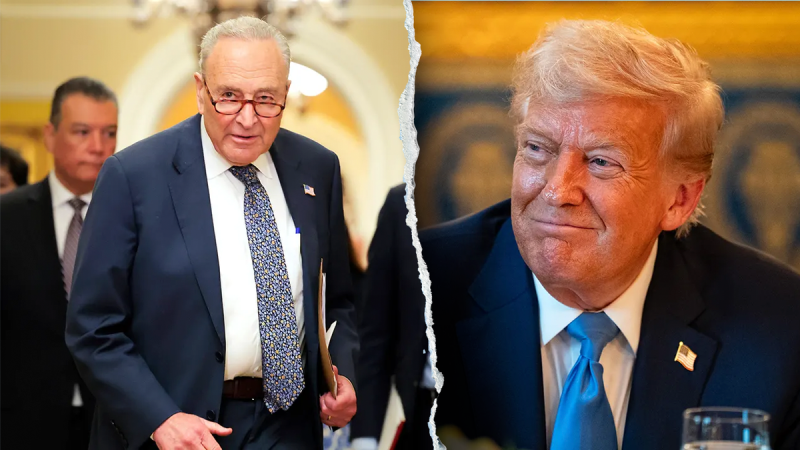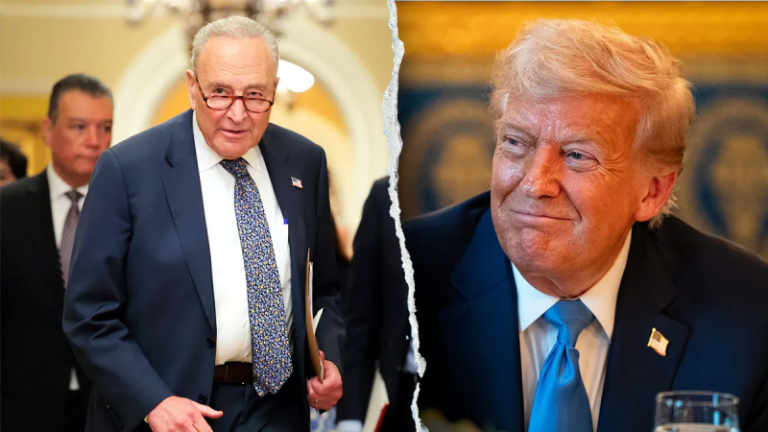
Senate Republicans are mulling whether to go nuclear after negotiations with Senate Democrats to ram through President Donald Trump’s nominees fell apart over the weekend.
The path to confirming dozens of Trump’s outstanding nominees was destroyed when the president accused Senate Minority Leader Chuck Schumer, D-N.Y., of ‘political extortion,’ and charged that the Democratic leader’s asking price for nominees was too high.
Now, lawmakers have left Washington without a deal to bundle dozens of nominees that made it through committee with bipartisan support, and a change to how the Senate handles the confirmation process is on the horizon.
Senate Majority Whip John Barrasso, R-Wyo., berated Schumer and Senate Democrats for their ‘unprecedented’ blocks of the president’s nominees, and noted that every pick had been filibustered save for Secretary of State Marco Rubio, who glided through the Senate earlier this year.
‘We have been working through the list, but there is still a large backlog because of the unprecedented filibuster by the Democrats of every nominee,’ Barrasso said. ‘And if they don’t change their behavior, we’re going to have to change how things are done here, because a president needs to have his or her team in place.’
Under normal circumstances, changing the rules in the Senate would require 67 votes, meaning that Senate Democrats would have to be on board with a change. However, there is a path that lawmakers refer to as the nuclear option, which allows for rules changes to only need a simple majority.
There is the political will among Republicans to change the rules, but doing so would open the door for Senate Democrats to do the same when they get into power once more.
‘I think that way is going to happen anyways, because of what Schumer has done. He’s forced this, and it’s ridiculous that he’s doing this,’ Sen. Markwayne Mullin, R-Okla., said. ‘And so, whatever, we’re at this point, and we’ll do, you know what they say, every action requires an equal [reaction], and that’s what we’re at right now.’
Some of the options on the table include shortening the debate time for nominees, getting rid of procedural votes for some lower-level nominees, grouping certain civilian nominees ‘en bloc’ – something that is already done for military nominees – and, at the committee level, deciding whether to lower the number of nominees subject to the confirmation process.
Currently, over 1,200 positions go through Senate confirmation. Senate Republicans have been able to confirm over 130 of Trump’s picks so far, but had a loftier goal of doing at least 60 more before leaving town until September.
And there are over 140 nominees still pending on the Senate’s calendar.
‘I think they’re desperately in need of change,’ Senate Majority Leader John Thune, R-S.D., told reporters. ‘I think that the last six months have demonstrated that this process, nominations, is broken. And so I expect there will be some good robust conversations about that.’
As to when lawmakers will try to run with a rules change is still in the air. The Senate is gone from Washington until early September and will return to a looming deadline to avert a partial government shutdown.
Before leaving town, the Senate did advance a trio of spending bills – a first in the upper chamber since 2018 – but those same bills are unlikely to pass muster in the House, given that they spend at higher levels than the ones greenlit by the House GOP.
Ramming a rules change through without Democrats could also come at a price for government funding negotiations. Schumer said a possible rules change would be a ‘huge mistake’ for Republicans to do on their own.
‘Because when they go at it alone, they screw up for the American people and for themselves,’ he said.
When asked if there were any possible rule changes that he and Senate Democrats could agree to, Schumer said, ‘We should be working together on legislation to get things done for the American people.’
‘That’s the way to go, not changing the rules, because when they change the rules, they say, ‘Only we’re going to decide what’s good for the American people,’ and every time they do that, the American people lose,’ Schumer said.
Still, Republicans were unhappy with the way negotiations devolved after days of back and forth.
‘We actually, we wanted a deal,’ Mullin said. ‘And these people deserve to be put in position… they’re going to say that we’re trying to do a nuclear option. The fact is, they – Schumer – went nuclear a long time.’

